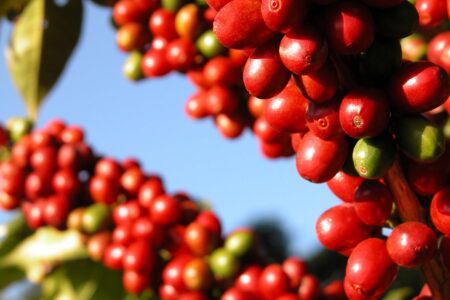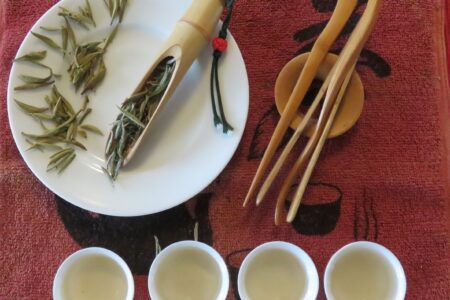The UAE aims to be a global leader in coffee & tea

Image: Pexels/NextVoyage
Expanding urbanisation, higher living standards, a quick post-pandemic recovery and adoption of Western coffee cultures are contributing to the growing coffee market in the UAE, while the interest in green and herbal/botanical teas keeps the tea market strong. Both industries are also benefitting from the business-friendly environment the UAE offers. By Shem Oirere
For centuries, coffee was a key ingredient in the Arab World’s hospitality industry and now in the United Arab Emirates (UAE), visitors are driving a new coffee consumption trend that has given the hospitality sector a more commercial meaning.
Serving coffee in the Arab world, including in the UAE, has shifted from being a mere ceremonial act of generosity to a more meticulous latest technology-driven service with coffee consumption now dominated by modern international and regional coffee companies that have now taken over from the “sheikhs and heads of tribes, elderly Bedouin men and women and owners of coffee trading shops” as the region becomes more integrated into the modern global coffee market.
For the UAE, a confederation of seven Emirates in the Arabian Peninsula, positive growth has characterised the coffee market in recent years despite being jolted by the outbreak and subsequent spread of Covid-19 in early 2020. The pandemic did indeed put breaks on exports, imports and rising consumption levels of coffee in the UAE, thus impacting sales of products such as ground coffee, instant coffee, whole bean, coffee pod and capsules.
The UAE’s coffee market growth has been attributed to the expanding urbanisation, higher living standards and fast recovery of the country’s tourism and hospitality industies post Covid-19. There has been an increase in consumption of diverse coffee products such as hot drinks, ready-to-drink and flavoured beverages as well as export and import volumes especially during the post-Covid period according to statistics by UN’s Food and Agriculture Organization (FAO).
FAO estimates the UAE’s coffee consumption per capita across all the seven UAE emirates of Abu Dhabi, Dubai, Sharjah, Ras Al Khaimah, Ajman, Umm Al Quwain, and Fujairah at 0.890 kg in 2019, albeit a 15.2 percent decline from 2018 figures. However, the negative consumption levels were reversed in 2020 when the annual average rose to 1.5kg for each of the 9.9 million people in the UAE. This though was less than the 5.7kg, 5.2kg, 3.9kg, 3.9kg, 3.1kg and 2.7kg consumed in other Middle East markets of Lebanon, Qatar, Cyprus, Bahrain, Kuwait and Jordan respectively according to Mohamad Merhi, managing partner and co-founder of Dubai-based specialty coffee roastery Cypher Urban.
On average, UAE coffee consumers could have drunk 14.8 million kilogrammes of coffee in 2020, an amount likely to rise on the back of Emirates’ rising per capita income, increasing tourist arrivals, expansion of the hospitality sector and preference for spending on non-alcoholic beverages across the Middle East.
Dubai offers a business friendly environment
The surge in per capita coffee consumption in the UAE coincides with an increase in coffee retail business, especially in Dubai, as franchise coffee chains and domestic coffee retailers take advantage of the conducive environment to set up coffee outlets.
According to the the UAE’s Business Registration and Licensing (BRL) sector in the Department of Economy and Tourism, Dubai, as of March 2022, had licensed 615 companies as coffee traders hence reinforcing the Emirate as a global trading hub for the commodity.
The coffee businesses include manufacturing, wholesale, and retail, import and re-export, as well as the retail of hot coffee in cafés and restaurants, ready-to-drink (RTD) coffee in grocery stores and retail outlets according to the report.
The report showed that the total number of licences issued during 2021 increased by 148 percent compared to 2020, when 69 licences were issued, compared to 171 licenses in 2021. UAE nationals topped the list of investors in the trading of coffee at 31 percent of the total followed by other nationalities such as British, Italian, Turkish, French, Egyptian, Jordanian, and Kuwaiti.
Dubai and Deira areas accounted for the largest share of the companies engaged in coffee trading with with 368 and 243 licences respectively. At least 64 percent of the coffee businesses in Dubai, the report says, are limited liability companies with a fast-growing number of Emirati companies engaging in the coffee trading. Some have even expanded to the global coffee market from the UAE according to the report including opening outlets in several countries via the services provided by Dubai Industries and Exports, an agency of Department of Economy and Tourism.
Elsewhere, the opening of the Dubai Multi Commodities Centre (DMCC), the UAE’s largest free-trade zone located in the Jumeirah Lake Towers district of Dubai, in 2005 was a turning point for the UAE’s coffee trading as the facility has steadily transformed itself and Dubai into an international commodity trading hub.
“The tea and coffee industries are increasingly turning to DMCC because of its world-class facilities, which include superior logistical and processing support for all stages of the value chain, cutting out intermediaries to deliver increased value for farmers, producers, and consumers alike,” said DMCC in its first half of 2022 report.
In 2021, the 7,500m² temperature controlled DMCC Coffee Centre stored and processed more than 9,000 MT of both green and roasted coffee “from a broad range of producing markets across Central and Southern America, Asia and Africa.” DMCC said it “doubled its membership count, demonstrating the significant progress made by the Coffee Centre as a high-quality logistics and distribution hub.”
And in 2020, Dubai Customs reports show trade in coffee in the first half of the year grew 5 percent to AED 253m (USD $69 million) compared with AED 240m (USD $65 million) in the prior-year period with volumes traded increasing to 14,000 tonnes.
Furthermore, the FAO indicates the UAE imported more coffee than it exported for the three years to 2020 as domestic consumption spiked driven by the growing expat population, tourist numbers and a fast-emerging Western coffee consumption culture. Coffee exports reached 4383.35 tonnes in 2020 up from 2768.94 tonnes in 2018, a 58.3 percent increase according to the UN agency. The UAE imports coffee from origin markets before adding value and re-exporting the commodity to high-consuming markets.
The highest export volumes were between 2018 and 2019 when the UAE sold an additional 1199.85 tonnes more to the international market. However, in what could be an indicator of an increasing coffee consumption trend in the UAE, FAO figures indicate the seven emirates imported more of the commodity for the three years to 2020 when an estimated 6497.08 tonnes of coffee were purchased by the Emirates.
Coffee imports rise steadily
Coffee imports, just like the exports, showed an upward trend from 5246.73 tonnes in 2018 that increased steadily by 23.8 percent at the end of 2020. The highest increase in coffee imports into the UAE was between 2019 and 2020 when an additional 1047.96 tonnes was sourced by both the public and private sector coffee buyers.
Elsewhere, Merhi said the value of coffee imports by the UAE increased steadily between 2018 to 2020 from USD $104 million to $175 million. The Emirates imported USD $111 million worth of coffee in 2019. The UAE coffee imports were equivalent to 9.1 percent, 9.2 percent and 14.3 percent of the total Middle East coffee imports totals for 2018, 2019 and 2020 respectively.
However, the effects of Covid on the global coffee trade impacted 2021 coffee imports with the UAE reporting a 13 percent decline in value to USD $145 million down from $175 million in 2020. The drop in imports, does not however, reflect across the Middle East market where the value of coffee imports increased from USD $1.2 billion in 2020 to $1.4 billion in 2021.
Official projections by the UAE government show the Middle East & Africa coffee market will grow at a CAGR of 7.5 percent between 2022 and 2027 while that of the UAE would increase by 8.3 percent for the same period.
Elsewhere, the DMCC Coffee Centre has provided an enabling platform for the international coffee franchises to offer customer-driven coffee products to cater for the diverse global coffee cultures triggered by the increasing number of tourists. The FAO indicated a 58 percent increase in tourist coffee consumption in the UAE between 2016 and 2019. It said that consumption increased from 2424 tonnes in 2016 to 3850 tonnes in 2019. Visitors consumed 3466 tonnes and 3521 tonnes of coffee in 2017 and 2018 respectively.
Furthermore, the UAE’s population has been growing steadily, with the country’s labour force coming from more than 200 nationalities. The foreign population in the UAE represents 89 percent of the Emirates total estimated at 9.9 million in 2020. Due to the diverse cultures, the UAE is in the middle of a changing coffee consumption trend that is aligned more to the Western world. This change ultimately influences the UAE’s coffee trade with the rest of the world.
Meanwhile, the UAE’s coffee market and trade received a major boost from hosting the second edition of the World of Coffee Dubai, an event that was organised by integrated event management firm DXB Live in partnership with Specialty Coffee Association (SCA). World of Coffee (WOC) is touted as a suitable platform for international coffee businesses wishing to break into the Middle East’s emerging coffee industry. Both coffee producing and consuming countries exhibited at the event that was held in January.
DXB Live’s senior vice president, Khalid Al Hammadi, said the event, one of the world’s major global coffee industry events in 2023, is a major boost to the UAE’s stature as “a regional and global hub for the coffee industry.” He added that “World of Coffee Dubai 2023 also provided industry representatives with exceptional opportunities to network with their peers.”
Moreover, the UAE’s economic growth is expected to remain robust according to the International Monetary Fund (IMF), supported by “a strong rebound in tourism, construction.” With the Emirates’ overall GDP growth projected to reach above 6 percent in 2022 up from 3.8 percent in 2021, the UAE coffee market is likely to growth further as the country intensifies implementation of structural reforms that are providing investment opportunity for both the public and private coffee market players.
The UAE tea market remains strong
The UAE is also emerging as a key trading hub for the global tea market with the country increasing both its exports and re-exports to consuming markets especially in the Gulf Cooperation Council (GCC) that includes Saudi Arabia, Kuwait, Qatar, Bahrain, and Oman.
An emerging health-conscious population, especially after the Covid outbreak and a preference for beverages that have immunity-boosting qualities, is driving the growing UAE tea trade with the International Trade Centre estimating the value of the country’s total exports and re-exports in 2020 at USD $316 million and $39 million respectively. Currently, the UAE is the world’s largest re-exporter of tea with a major share in the global market, according to government reports.
The UAE has leveraged on this growing tea trade to set up the Dubai Multi Commodities Centre (DMCC) Tea Centre within the Jebel Ali Free Zone where subscribed members have the option to 100 percent own the tea trade operations with little or no personal and corporate tax or restrictions especially in when it comes to capital repatriation. At the Centre, traders have opportunity to package their tea, sourced from various producing countries, for re-export. In 2022, the Centre produced 8,200 tonnes of packaged tea, including 400 million tea bags, the equivalent of 27 percent growth compared to 2021.
More tea trade opportunities are likely to emerge during this year’s Global Dubai Tea Forum, the first one after a five-year hiatus. The event, slated for 25 – 27 April, under the theme ‘Unpacking the Future of Tea: From consumer trends to new market opportunities’, will bring together global tea producers, suppliers, buyers, governments, and other industry stakeholders “to discuss and explore the key consumer trends, market forces, and significant opportunities that will drive tea’s global growth.”
Since its inception, the Tea Centre has transacted around 425,000 metric tonnes of tea from 12 different origins servicing about 50 brands, per the DMCC.
Key tea buyers from Dubai such as India and Sri Lanka have set up shop at the DMCC Tea Centre to enhance access to the market with possibility of expanding to the rest of the Middle East markets where tea re-exportation is popular.
Kenya, India, Sri Lanka are top suppliers of tea to the UAE in 2020 per the ITC. Kenya’s and Sri Lanka’s value of tea exports to the UAE increased in 2020. While India’s declined. Overall, the UAE’s tea re-exports of flavoured and non-flavoured tea declined by 50 percent to USD $39.8 million according to ITC statistics that have been derived from the United Nations Comtrade database aggregates.
Similarly, imports dipped by nearly 8 percent during the same period, a trend observed since 2017. The value of tea imports dropped to USD $187 million in 2021 versus $194 million the previous year.
The ITC reports that Russia, Iraq, Iran, Egypt, Ukraine are the UAE’s biggest tea re-export markets as the Middle East country rides on its flexible trade norms, favourable taxation policies and strategic geographical location to strengthen its position itself as a global tea-trade hub.
For some of the UAE’s export and re-export markets, the ITC’s statistics shows an interesting trend between 2018 and 2020 such as the emergence of Saudi Arabia as the preferred tea export destination dethroning Russia from among the top five. The value of the UAE’s tea exports to Russia in 2018 was estimated at US $49.71 million, higher than that of Iraq, Saudi Arabia, Kuwait, and Oman estimated at $48.52 million, $6.59 million, $3.96 million, and $2.34 million respectively. However, in 2020, Saudi Arabia emerged as the top export destination with tea valued at $86.48 million, more than 1000 percent increase.
Tea exports to Kuwait and Oman in 2020 grew by more than 1000 percent and 800 percent to USD $44 million and $22.56 million, respectively. Conversely, tea imports from the UAE that year by Russia and Iraq declined by 41 percent and 55.89 percent, respectively.
Consumption
Tea remains a popular beverage in the Middle East with market research firm Frost & Sullivan saying demand for tea as a hot beverage “is increasing in the GCC and is strongly backed by product innovations incorporated into the product and marketed in the region.”
The report further notes that increased interest in health and wellness is driving the demand for infused tea in the GCC market. Additionally, Frost & Sullivan find that the post-Covid period has seen an increase in demand for infused herbal tea, especially with ingredients such as peppermint, ashwagandha, ginger, and probiotics. The popularity of the teas is driven largely by the products’ overall functional property-enhancing qualities more specifically those associated with boosting of consumers’ body immunity. The UAE, like in many GCC markets, is experiencing a trend where consumers prefer green tea partly because of they have found new flavours in the product.
With the UAE’s focus on long-term growth for its coffee and tea markets backed by a deliberate move by public and private sector to integrate innovation into these commodities’ supply chains, chances of this Middle East country emerging as one of the top global markets in tea and coffee, are extremely high.
- Shem Oirere is a freelance business journalist based in Nairobi, Kenya. He has spent more than 25 years covering various sectors of Africa’s economy including the region’s agribusiness. He holds BA in International Relations and Diplomacy from the University of South Africa and earned a higher degree in journalism from the London School of Journalism and is also a member of the Association of Business Executives (ABE).



